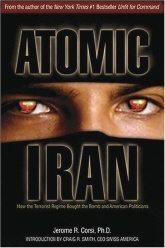On a September morning in 490 B.C., 9,000 free citizen soldiers from Athens watched the 26,000 Persians, disembarking their ships that were beached beside the plain of Marathon. On the bluffs above, the Athenian general, Militiades, saw that the Persians were not fully prepared. Their archers, who could flood the sky with arrows, were not ready. He therefore commanded his men to run across the open mile of field and to attack. They drove the Persians back into the sea.
Many historians consider the battle of Marathon the most influential in human history, believing it to mark the beginning of the ascendancy of the West over the East. Others maintain that without that battle’s outcome in favor of the Greeks, there may not have been a Western civilization.
Jerome Corsi, in his new book, Atomic Iran, makes the case that the West is again poised with the modern incarnation of Persia for a confrontation for the ages. And like the marathanomicoi (the men who fought at Marathon) we cannot afford to wait for Persia to attack.
Co-author of Unfit for Command, a book that undeniably influenced the presidential election in favor of George Bush, Corsi’s current book has a two-part central thesis. One, Iran is extremely close to having all the components necessary to launch a nuclear-tipped missile at Tel Aviv or to develop and detonate a modular nuclear device in the center of Manhattan or both. Two, because the Mullahs ruling Iran are themselves of the same mindset as the suicide terrorists they fund and deploy, they are likely to use those weapons sooner rather than later. Corsi’s mission is even more messianic than influencing a U.S. presidential election. It is nothing less than the jump starting of a populist revolution in Iran.
Atomic Iran is also a useful compendium of the contributing events and themes that have influenced this current buildup to the new cold war with Militant Islam and its looming twenty-first century version of the Cuban Missile Crisis. For example, he convincingly contends that the U.S. is already at war with the entire Islamic terror network including Hamas and Hezbollah and their financier, Iran. After first taking American hostages during the Carter administration, Iran has been conclusively linked to the murder of American military personnel in the Beirut, the Khobar Towers in Saudi Arabia, and today in Iraq.
Corsi quotes Iraqi Defense Minister, Hazem al Shaalan, after the capture of the leader of the insurgents in Fallujah last December”…Iran is the key to terrorism, which is the one enemy for Iraq.” Iraqi defense forces have confirmed that Iranian government is funding and cooperating with al Zarqawi and al Qaeda in the killing and beheading of hostages. Corsi makes clear that Iran, which is running an unpopular radical Shiite theocracy, can ill afford to have a popular Shiite secular regime on its western border and is now actively engaging U.S. and allied forces to stop it.
Another important theme developed in Atomic Iran is that the American Left generally and the Democrat party specifically has shown itself to have continuously fallen prey to the same appeasement philosophy of Neville Chamberlain and in so doing, has hastened not only the Iranian but also the North Korean nuclear threat. He exposes all too clearly for the timid the mundane symmetry present in the Democrats’ handling of the two rogue states. Corsi recounts how the Clinton Administration’s policy of “Agreed Framework,” provided for lots of other economic aid, better stated extortion payoffs, and gave North Korea nuclear fuel to be used for power generation. He writes, “Since nuclear fuel in this form was halfway to weapons grade already, enriching it to weapons grade would be easier.” Now we know that the mad Kim Jong Il played Madeline Albright and her boss for fools. Thanks to them and their access to U.S. our taxpayer funds, North Korea achieved its objective of becoming a nuclear power sooner and more cheaply. Some military analysts believe North Korea can now reach the Western U.S. with nuclear tipped missiles, a chilling thought considering Kim Jong Il is both a puppet of the Chinese and is widely considered mentally unstable.
Atomic Iran is another thorough and searing endictment of the modern American Left. Corsi recounts that, during the presidential campaign, the Kerry/Edwards position with respect to Iran, a country with the fifth largest proven oil reserves in the world, was an appalling Korea redux, calling again for us to give Iran partially processed nuclear fuel. Little wonder that one of Kerry’s top campaign supporters was a mysterious Iranian financier by the name of Hassan Nemazee, a man who raised over $500,000 from what Corsi identifies as “pro Mullah sources.”
In June of 2002 at a fundraiser sponsored by the American Iranian Council (AIC) where John Kerry was the keynote speaker, Namazee attacked the Bush Administration for its Visa Entry Act which made it more difficult for Iranians to get into the U.S. Kerry’s speech followed where he lamented that Bush was failing Iran because he didn’t, “…see the world through the eyes of the Iranians.” To which Corsi adds, “Maybe if we just learned to see the world their way, we would be happy to let them kill all the Jews and send their sleeper cells across our borders to kill us here at home.” The reader of Atomic Iran might reasonably ask: If the Democrats were working for our enemies, the rogue states of Iran and North Korea, how might their activities have differed?’
The second element of Corsi’s central thesis is more alarming than the first. Not only is Iran extremely close to the point of no return in their drive to obtain nuclear weapons, thanks in part to our own American left, but the religious fanaticism of the ruling Mullahs will make them susceptible to using their weapons and or providing them to terrorist groups. Iran is a state that invented car bombing and vest-bombing methodologies, often sacrificing their own children or those of their surrogates. Unlike our past enemy, the men who ran the Soviet Union, Iran is a terrorist regime deeply enamored with the sanctity of suicide, enraptured by religious martyrdom.
Thanks to Corsi and Arabic language translation services, we know that Iran’s President, Muhammad Khatami has publicly stated his intention to attack Israel and the U.S. “Our missiles are now ready to strike at their civilization, …we will launch our missiles at their cities and installations,” he told his rubber-stamp parliament. While reading the mad Mullah’s quote in Corsi’s book, the thought occurred to me that President Bush has the duty to add to the security policy of the United States a tenant which flatly states that, if any country (such as Iraq and Iran who have both threatened us with annihilation), declares or has declared their intention to make war on us or our allies, we reserve the right to take them at their word, and (like the Athenians at Marathon) not wait to be attacked. This, it seems, might make life a little more difficult for our enemies abroad and adversaries within.
NOTE: Publication: HumanEvents





